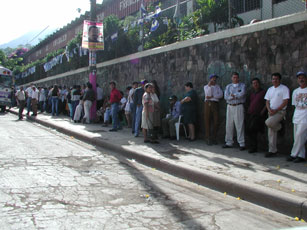

Democracia y terrorismo
By Marc Becker & Cheryl Musch
(Originally written for the Wisconsin Coordinating Council on Nicaragua (WCCN), November 8, 2001.)
On November 4, Nicaraguans went to the polls to elect a president, vice-president, and deputies for both the National Assembly and Central American Parliament. The conservative Liberal Constitutional Party (PLC) beat the National Convergence, a left/center coalition led by the Sandinista Front for National Liberation (FSLN), in all of these races, with wealthy businessman Enrique Bolaños defeating Daniel Ortega for the presidency.
We were part of an international delegation organized by Tecnica which the Sandinista Workers Confederation / José Benito Escobar (CST/JBE) and the FSLN invited to observe the elections. We were positioned in the rural community of Solingalpa on the outskirts of Matagalpa in northern Nicaragua. The voting process was painstakingly slow and very diligently monitored by party officials as well as national and international observers. We observed careful checks of identification cards and the marking of thumbs with indelible ink to prevent fraud.
The ballots were carefully counted and recounted in a process that took almost as long as the casting of the votes. We accompanied the ballots as they were escorted to the municipal electoral council, with the count then subsequently reported to the central computing center in Managua. By all appearances, despite minor irregularities the casting of votes was legitimate and free of fraud. Subsequently, however, the computer tallying of votes for the National Assembly has been very slow which has led ex-president Jimmy Carter to express concern about this process.
The U.S. presented the vote as a victory of democracy over terrorism. The discourse surrounding this election contains strong echoes of the 1990 vote which ousted the Sandinistas after 11 years in power. In both elections, pre-election polls indicated that the Sandinistas would win, but in the privacy of the voting booth many of these same people voted for the opposition. Why was this?
In 2001 as in 1990, the United States made it crystal clear that a Sandinista victory was unacceptable. In what would be a violation of U.S. electoral laws, Oliver Garza, the United States ambassador to Nicaragua, campaigned actively for Bolaños and against the Sandinistas. The vote represents the right successfully placing fear into people over what would happen to them if they voted for their own socio-economic interests. The result will be a continuation of the PLC government's neoliberal programs favored by international lending organizations, resulting in an entrenchment of cheap labor in the maquilas and a cutting of social services.
While polls did not indicate that the events of September 11 had a noticeable impact on people's political preferences, the United States took significant advantage of these attacks to paint the Sandinistas as terrorists. A full-page ad published in La Prensa several days before the election declared that "George W. Bush Supports Enrique Bolaños" and stated that "Daniel Ortega is an enemy of everything the United States represents. Further, he is a friend of our enemies. Ortega has a relationship of more than 30 years with states and individuals who shelter and condone international terrorism." In a very dirty campaign, the PLC and the U.S. attempted to associate the Sandinistas with terrorism, war, repression, shortages, and human rights abuses. The election boiled down to the Sandinistas and Daniel Ortega versus the U.S. government.
Meeting with our delegation on the eve of the elections, Daniel Ortega expressed his condolences for the attacks in New York and Washington, and proceeded to note that Nicaraguans can identify with our pain because they have also been the victims of terrorist attacks. Ortega strongly denounced terrorist tactics, as did other people we talked to on the street. Ironically, it appears that the U.S. utilized Osama bin Laden in the 1980s to help fund the contras' terrorist attacks on the civilian population in Nicaragua.
One of the biggest contributions that the Sandinistas brought to Nicaragua during their time in power was a stable and effective democratic system of government. Placed in its broader global context, the irony is not that the Nicaraguan people have used this democratic system to keep the Sandinistas out of power, but that the United States continues to engage in intimidation tactics that create fear and terror and undermine the democratic will of the Nicaraguan people.